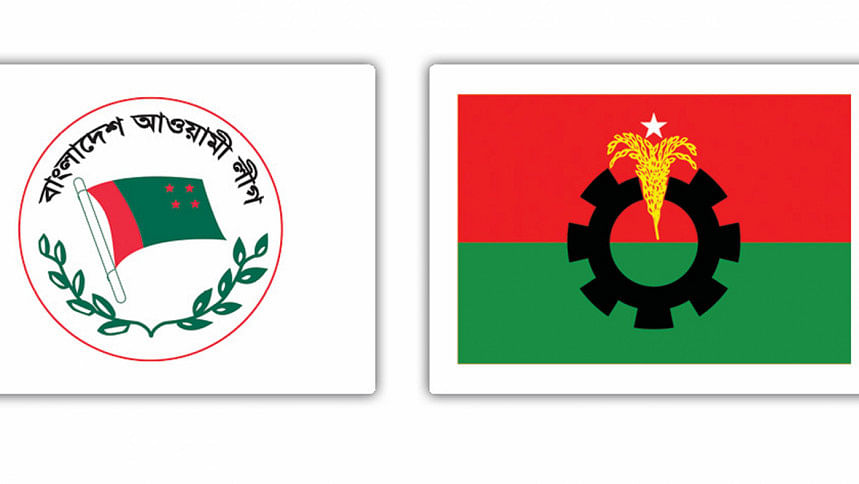Social Media Strategy: AL coordinated, BNP less so
Bangladesh Awami League uses a highly-coordinated network of social media handles – profiles, groups and pages — to disseminate information on Facebook, but over 80 percent of those do not declare their political affiliation.
Only 19 percent of the pages, verified profiles, or groups that shared the Awami League’s top links had “Awami League” in their name.
For the BNP’s highly shared links, the figure was 64 percent.
Tech Global Institute (TGI) yesterday released a report, titled “How Facebook Has Become a Political Battleground in Bangladesh”, unveiling these findings.
TGI is a policy lab with a mission to reduce equity and accountability gaps between technology platforms and the Global South. It works at the intersection of private technology companies, civil society and government.
Calling this network “highly sophisticated”, TGI in its report said, “It appears that Awami League’s content is more frequently shared on [Facebook] groups or pages with names that reflect cultural or political affiliations other than the party’s own name.”
The report analysed nearly half a million posts shared across 14.4 million followers, resulting in 97.5 million interactions. It also investigated the behaviors of over 600 partisan Facebook pages and groups likely affiliated with AL and BNP.
“Partisan content is often shared by unassuming groups and pages that do not bear the party’s name or disclose their association. Group or page names can, hypothetically, include ‘Good Morning Bangladesh’ or ‘Our Dhaka’. They typically tend to be partisan actors that are misleading users about the fact that they are partisan and sharing hyper-partisan content,” it said.
It also said there is a risk that these influence operations, which are disseminating organic hyperpartisan content, are swaying public opinion.
The report compared how posts made by pro-BNP and pro-AL platforms perform over time to provide evidence of social-media engineering.
“In the first five minutes, the AL and BNP posts organically each saw only one percent of their respective share counts. In the next 10 minutes, no one shared the BNP post, but the AL post saw 25 percent of its total share count.
“About 71 percent of the AL post’s shares took place in just three hours … The BNP post had seen no shares till the three-hour mark.”
The report added, “Between the third and 12th hour, the BNP post saw a massive 68 percent of its total share count while the AL post saw an additional 18 percent.”
Meanwhile, between the first and third day, the BNP post saw an additional 20 percent shares, while the AL post saw only four percent.
“We find that Awami League has a more centralised [where a bulk of the content is driven by a very small number of mediums] dissemination strategy relative to BNP. The latter tends to have a more decentralised approach, likely driven organically by their supporters.”
AL’s official verified page, with 3.4 million followers, shared nearly 9,500 pieces of content during the timeframe of TGI’s analysis (excluding third-party links). The party shared content every hour of every day, and at least 25 pieces of content for every 24 hours for the past year, said the report.
In AL’s case, 91 mediums shared the same content within a span of 13 days of initial posting, while for BNP, 50 mediums shared within the same time span, the report said.
“Although the BNP formally launched its official, verified Facebook handle, bearing the party’s full name, in 2019 — years after the Awami League did so in 2013 — the opposition party already had a sizable presence due to unaffiliated influencers with a large following.”
The report mentioned that BNP ramped up their social media presence prior to the January 7 election.
“In July, BNP’s pages had amassed over 4,500 posts, marking a significant rise from fewer than 3,000 posts in the preceding month. In September, these pages added just under 4,000 posts, but in November, this number almost tripled, surpassing 11,000.”
The report recommended transparency for organic partisan content.
“Online constituencies do not know whether a page or group bearing the party’s name is formally affiliated with a political party — operated professionally by an official member or paid by the party,” said the report.
“AlthoughMeta [the company that currently owns and operates Facebook, Whatsapp, Instagram, Threads and more] requires pages and groups to categorically disclose whether they are affiliated with a political party or not, the policies are not sufficiently nuanced to differentiate between affiliations [whether it is member of the party or a paid operator] and support,” it said, adding, “People can follow a page or join a group without knowing its partisan affiliation, especially when the political party chooses to disseminate their messages through non-partisan names.
“A group, page or verified profile sharing partisan content organically should provide some transparency about their association with the party, especially if they do not categorically bear the party’s name. Second, a page or group bearing a political party’s name should go through verification to reduce risks of impersonation and misrepresentation,” they recommended.
londonGBDESK//



Comments are closed.